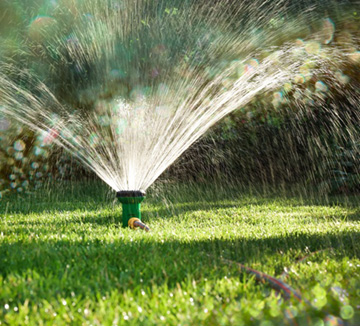 As a first-time homeowner, you may not know exactly how to care for that green lawn surrounding your new home. Even long-time homeowners can be a bit mystified by the process. Though it seems easy – you just turn on the sprinkler – when and how much you water your lawn can have a big effect on its overall health. Here is what you need to know about watering your lawn so it looks great all summer long.
As a first-time homeowner, you may not know exactly how to care for that green lawn surrounding your new home. Even long-time homeowners can be a bit mystified by the process. Though it seems easy – you just turn on the sprinkler – when and how much you water your lawn can have a big effect on its overall health. Here is what you need to know about watering your lawn so it looks great all summer long.
Why you should to water your lawn
Although it may seem like watering your lawn is unnecessary, it’s actual quite important. When your lawn doesn’t get enough water, it grows shallow roots. In order to have healthy grass, it needs to have deep roots. Deeper roots make it easier for your lawn to withstand periods of drought or intense heat. When your lawn isn’t getting any water at all, it can turn brown. The ground will dry out and become hard. This makes it more difficult for it to absorb moisture when it does get watered. At this point, you will likely need to reseed the lawn or replace patches of grass.
When you should water your lawn
Many people aren’t aware that there are certain times of the day when it is most beneficial to water your lawn. The best time of the day to water your lawn is in the early morning. This allows the water to absorb before it evaporates. Watering during the hottest parts of the day will cause the water to evaporate before it penetrates the lawn. And watering at night can cause the moisture to linger on the grass for too long, which can cause disease. It is best to water your lawn 2 – 3 times a week instead of every day. Watering for longer periods of time allows the water to penetrate deeply, instead of watering for shorter periods of time every day. The more deeply the water penetrates, the deeper the roots will grow.
How much you should water your lawn
You want to water enough so that your lawn gets between one and one-and-a-half inches of water per week. If you are unsure how much water your lawn is getting, install a rain gauge. This will also help you to determine if you’ve gotten enough rainfall so that you don’t need to water. Another good test to know if you’re giving your lawn enough water is by pushing a screwdriver into the ground. If you cannot push it in at least six inches, your lawn is not getting enough water.
Watering with sprinklers
If your home has installed sprinklers, then much of the work is done for you. However, you will need to determine how long to run them. Use a rain gauge or even empty tuna cans spread around your lawn and let the sprinklers run for 15 minutes. Once you’ve finished watering, measure how much is in each can to see if you need to run the sprinklers for a longer period of time.
Watering by hand
If you don’t have installed sprinklers, you can water with a rotating sprinkler attached to your hose. Again, gauge how much water is being delivered to make sure you’re giving your lawn enough water. Move the sprinkler around the lawn to ensure even distribution. You may need to allow extra time for particularly sunny and dry areas of your yard.


